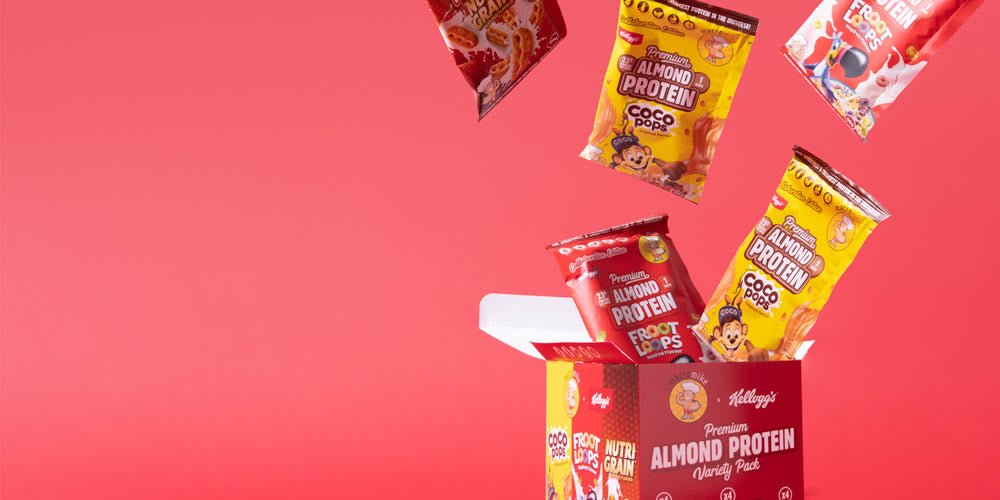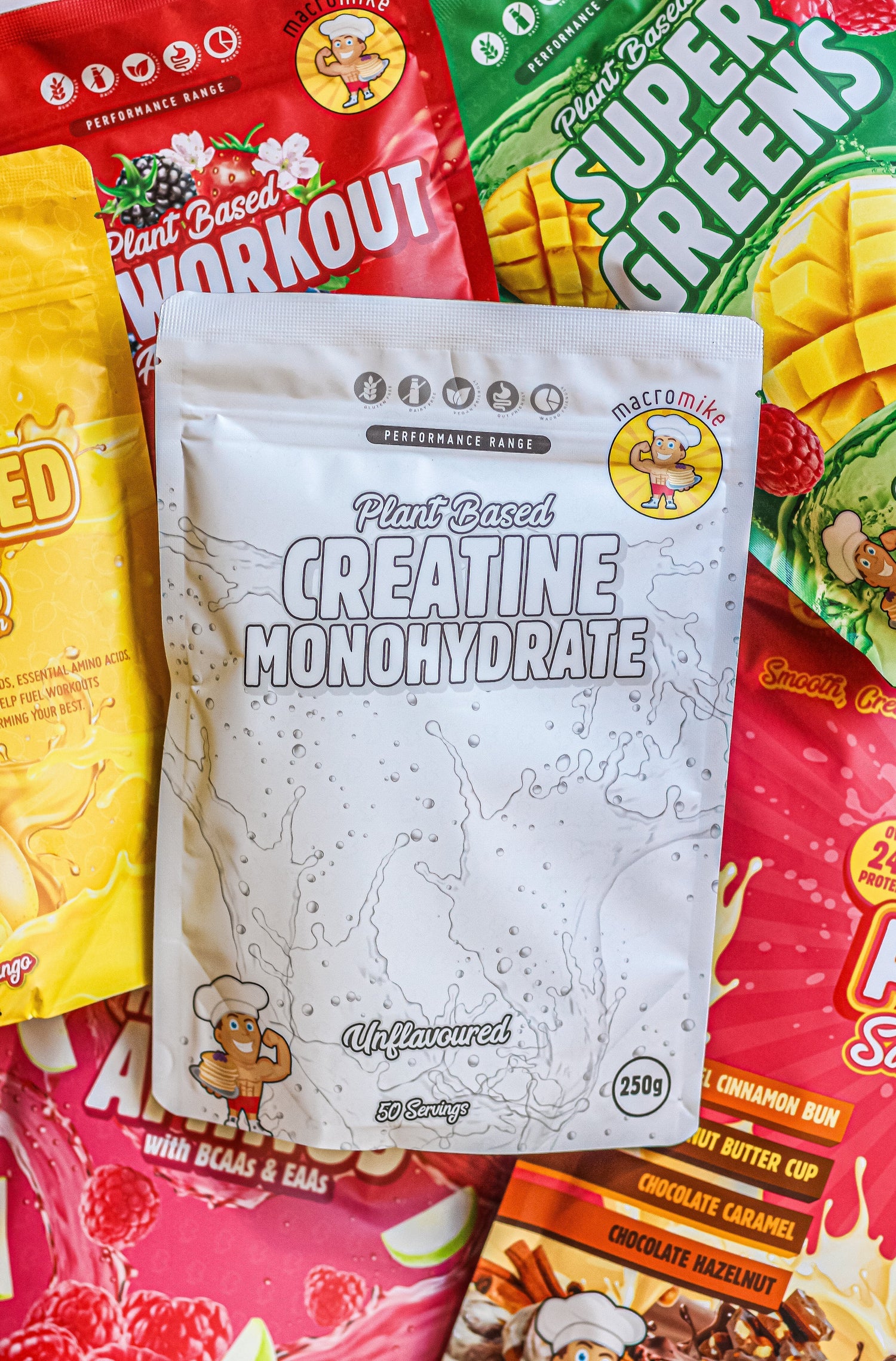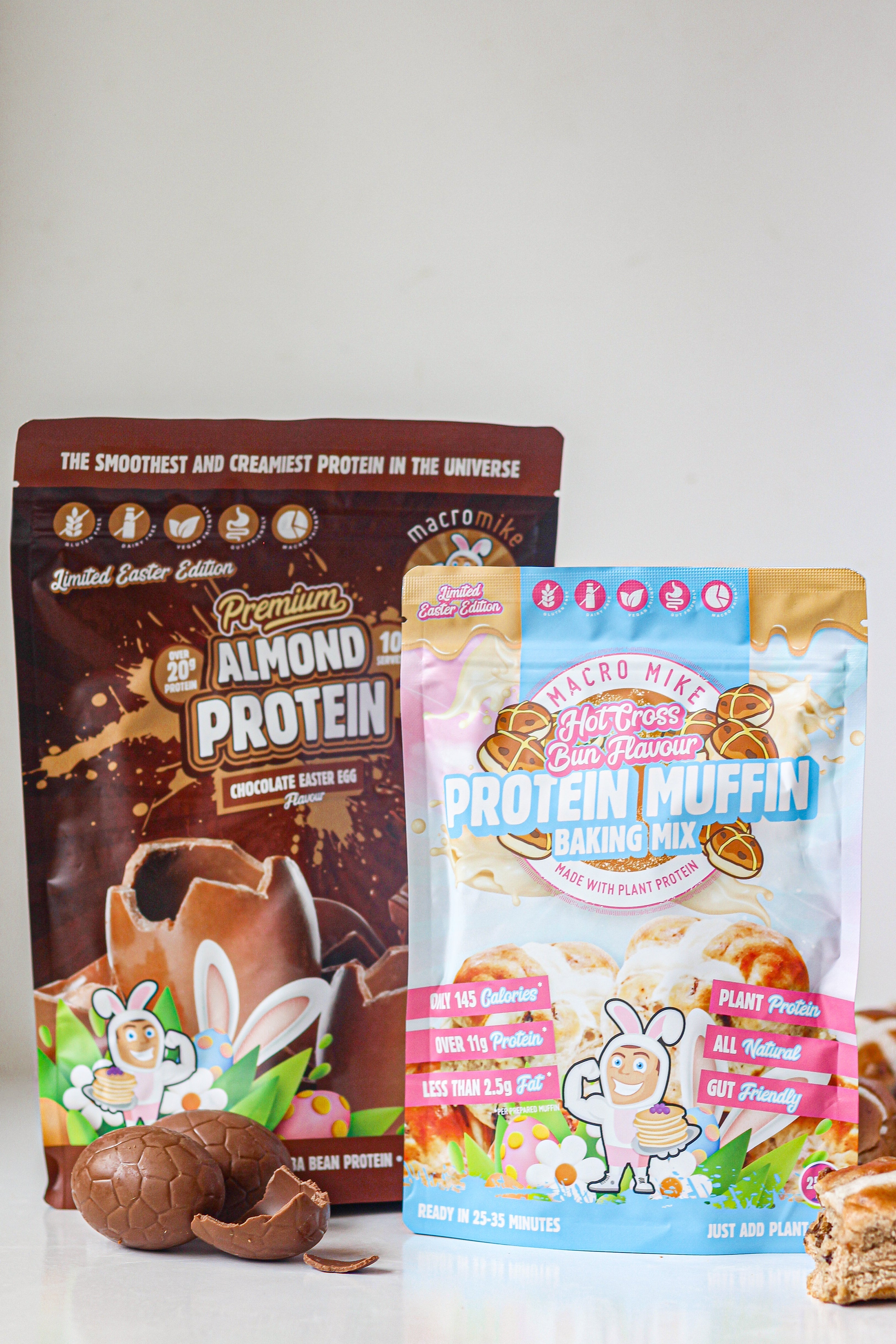Blog written by Dietitian & Nutritionist Helena
Creatine is hot right now, and for good reason. It’s been known for some time that it supports exercise performance, but there is also emerging research to suggest its benefits extend far beyond this, particularly for females.
Here at Macro Mike, we are so proud and excited to be launching our own range of creatine supplements.
WHAT IS CREATINE?
Creatine is a substance that we naturally have in our bodies, in muscle and brain tissue, and it’s also found in foods like red meat and seafood. It’s not a protein but has a similar structure and essentially helps our bodies produce more ATP, which translates to energy. Creatine gets used up quickly by exercise, and from stressful conditions that strain us physically or mentally. When we have more creatine available to us, we can produce more ATP (energy), reduce fatigue and therefore train harder and for longer. It’s not all about gains either – there are other key benefits like bone health, concentration, memory, mood and even pregnancy outcomes, which we’ll discuss shortly.
Our body produces creatine on its own, and as I mentioned, we can consume creatine from animal-based foods. The problem is that we generally can’t produce or eat enough to maintain optimal stores of creatine in our muscles. You’d need to be eating around 1kg of meat per day to do so – this would be difficult and would come with other downsides to your overall health, so isn’t recommended. If you follow a plant-based diet, or occasionally eat meat but also eat a lot of vegetarian meals, you likely have a lower intake of creatine, and as such, lower stores. Women also have lower stores of creatine than men because we biologically have smaller amounts of muscle.
Supplementation with creatine is an easy way to maximise the amount of creatine in your muscles, so that your body can produce more ATP (energy) and therefore get you performing at your best, particularly if you’re female and/or don’t eat much (or any) meat or seafood.
THE MAIN REASONS WE LOVE IT:
MUSCLE AND STRENGTH GAINS
Creatine is most effective in improving outcomes for intense, short bursts of exercise like weight training. Creatine itself doesn’t build muscle, but when you have more creatine available in your muscles, you have more energy available for training and will take longer to reach fatigue, therefore you’re able to train harder and get better results, like muscle and strength gains.
Studies in men have observed creatine supplementation can lead to 5-15% improvements in bench press, squats, leg press and chest press, as well as increases in fat free mass (aka muscle gain) without any additional fat gain. The same improvements in muscle and strength gains have also been observed in women when creatine supplementation has been compared against placebo.
MEMORY AND BRAIN POWER
One of the coolest areas where creatine has been researched is brain health. Like our muscles, our brains need to produce ATP for energy. Stressful conditions like sleep deprivation, mental disorders like depression, and cognitive impairments like Alzheimer's disease require more energy, and subsequently more ATP. This in turn uses up more creatine, as it’s needed to produce the ATP for energy.
Studies have looked at the difference between supplementation with creatine vs no supplementation for performance on things like memory tests, sports drills and other tasks requiring concentration. They have consistently found that results are improved after the creatine supplementation. This positive effect is amplified when there is a stressful condition at play, e.g. when participants have been deliberately sleep-deprived.
Why is this cool?
It means that taking creatine could potentially help us maintain better mental health, and function better day to day (e.g. at work or in daily life concentrating and remembering things), especially under high stress. This feels especially relevant if you’re a parent of young kids, a shift worker, or someone with any reason to be running on high stress and not a lot of sleep!
BONE HEALTH
How often do you think about your bone health? It’s easy to take strong bones for granted, but it’s incredibly important to be working on your bone health throughout your life, because once you reach your older years, bones can become very vulnerable. This is particularly true for pregnant, postpartum and post-menopausal women, where hormonal changes can cause more bone breakdown, leading to higher risk of fractures.
Research into this area has observed that creatine alone doesn’t seem to improve bone mineral density, but when combined with weight training – which is known to improve bone health - it has greater improvements than the weight training alone.
Even if the evidence isn’t super robust at this point, creatine is such an easy addition to your day it’s worth doing anyway.
PREGNANCY
This is a ‘watch-this-space’ kind of area, as we don’t have studies on humans supplementing with creatine during pregnancy yet. Animal-based studies have found that creatine may be beneficial to reduce the risk of low birth weight and pre-term births and may even be protective to the baby’s organs during times of increased stress e.g. reduce damage from low oxygen availability during a caesarean section.
HYDRATION AND CARB LOADING
Creatine draws more water into cells, which means it may improve hydration status, and it also seems to help with storage of glycogen (basically our storage unit of carbs), so if you’re loading up on carbs in preparation for an endurance event like a marathon, loading creatine alongside this may be beneficial.
ARE THERE ANY DOWNSIDES?
Not really! Creatine may increase your weight on the scales, but this is generally just reflective of increased water uptake inside the cells and/or increased muscle mass from improved performance at the gym. Creatine isn’t associated with fat gain, and you aren’t likely to notice any of the water weight in your appearance.
Given that creatine occurs naturally in our bodies and our diets anyway, supplementation is considered very safe. It’s wise to purchase creatine from a reputable source and ensure that it has been third party tested so that you can be sure it is not contaminated with any other substances.
Some people experience gastrointestinal disturbances when starting creatine, particularly if taking high doses, but this can be minimised by taking a smaller dose or splitting across the day, and this generally resolves after a few weeks.
HOW MUCH TO TAKE
You can either do a loading phase with a short-term high dose to achieve muscle saturation quickly, and then continue with a smaller maintenance dose long-term, or you can skip this and just take a smaller dose consistently, but it will take longer to fully saturate your muscles.
Loading phase: take 20g for 5-7 days (ideally split this across the day, e.g. 10g twice per day, or 5g four times per day), followed by 3-5g indefinitely.
Non-loading phase: take 3-5g daily.
WHEN TO TAKE
Ideally, you should take creatine every day, and time it with your post workout meal because it seems most effective when taken with a source of carbs and protein, and after a training session. This isn’t essential though, and the main thing is just to be consistent with it daily (even if you aren’t working out).
HOW LONG TO TAKE IT FOR
Forever! There’s no need to take time off creatine, and its safe for most people to take indefinitely. Check with your doctor or dietitian if you’re not sure though.
So… are you sold yet?
We have a few delicious new flavours to try – go check them out here: https://macromike.com.au/collections/performance
Hi, I'm Helena! Dietitian, nutritionist and plant-forward eater providing tailored nutrition services to women navigating their gestational diabetes and postpartum journey.
Instagram: @nutrition.by.helena
Website: https://nutritionbyhelena.com/































